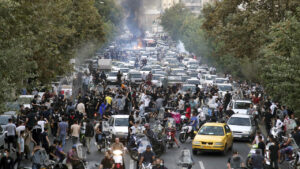
Iran has carried out the executions of three men who were accused of engaging in violent acts against security officers during anti-government protests last year, despite objections from human rights groups. The judiciary’s website, Mizan, announced on Friday that Majid Kazemi, Saleh Mirhashemi, and Saeed Yaghoubi were executed. The statement did not provide specific details about the method used for the death penalty.
According to authorities, the three men were responsible for the killings of a police officer and two members of the paramilitary Basij group in Isfahan, Iran’s third-largest city, during nationwide protests in November 2022. They were convicted of “moharebeh,” an Islamic legal term meaning “waging war against God.” The charges against them included using weapons, forming a group to undermine national security, and collaborating with the Mujahedeen-e-Khalq (MEK), a Europe-based group that Iran considers a “terrorist” organization.
The Supreme Court dismissed their appeal cases, stating that there were no credible reasons to accept them. The court viewed their actions as attempts to “overthrow the holy Islamic Republic establishment” and noted their involvement in arson during the “riots.”
In anticipation of the executions, the families of the three men staged demonstrations earlier this week outside the central prison in Isfahan where they were held. They released videos appealing for public support. Online videos also circulated, showing numerous cars gathering near the prison with drivers honking their horns and chanting slogans in an effort to halt the executions. A handwritten message, allegedly penned by the condemned men and expressing their plea for survival, was widely shared online: “Don’t let them kill us.”
The protests initially erupted in mid-September 2022 following the death of Mahsa Amini, a 22-year-old woman who was arrested by the “morality police” in Tehran for allegedly violating the mandatory dress code for women. While the demonstrations have largely subsided in recent months, sporadic acts of defiance persist, including an increasing number of women refusing to adhere to the dress code.
Foreign-based human rights organizations have reported that more than 500 people lost their lives during the unrest, with approximately 19,000 individuals arrested. While many have been released since then, concerns regarding human rights violations continue to be raised by international observers.

Putin Hosts 36 World Leaders At BRICS Summit, Defying Western Isolation
Kenya’s Deputy President Gachagua Impeached In Historic Senate Vote
Hamas Confirms Death Of Leader Yahya Sinwar, Maintains Hostage Release Conditions
IDF Investigates Whether Hamas Leader Sinwar Was Killed In Gaza Strike